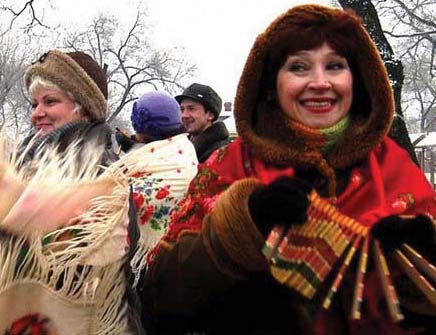| Zdravstvuyte, China |
| http://www.sina.com.cn 2005/07/14 20:09 thats China |
 Russina women in Harbin Today, there are still plenty of Russians working in Harbin, known as Kharbin to Russians, along with others who visit as tourists, and the Daoliqu District of the city, with the restored Russian Orthodox Church of St. Sophia and other buildings with distinctly un-Chinese spires and turrets, is a visible reminder of the city's Russian heritage. But in the early 1920's, there were close on 200,000 Russians living in Harbin. Known as Harbinets, three generations of them, the last of whom left in the mid-1960's, would call the city home. The Harbinets who returned to the USSR then got a warmer welcome than the ones who went back in the 1930's. Stalin regarded them as traitors or White Russians, the anti-Bolsheviks who had fought a bitter civil war against the Red Army after Lenin and the communists had seized power in 1917, and many became victims of his Great Purge of 1936-38. It was the Russian Civil War of 1917-1922 that sparked the biggest wave of Russian immigration to China. Tens of thousands of White Russians arrived in China via the Russian Far East. Others crossed the border into Xinjiang in the West. Some were aristocrats, others soldiers from the Tsar's old armies and supporters of the monarchy. They were fleeing political purges, the forcible collectivization of their land and famine brought on by the civil war. Many arrived with little more than the clothes they stood up in. After China formally recognized the USSR in 1924, most were left stateless and stranded in China. Harbin was their first port of call, but many then headed south to Shanghai, where their stateless plight saw them treated as second-class citizens by the other foreign communities in the city. Out of sheer necessity, they were obliged to stick together and to be separate from other foreigners, and eighty-odd years on that hasn't changed. Shanghai in the 20's and 30's was the most cosmopolitan and decadent city in the world, so much so that a whole industry has grown up documenting the wild life led by foreigners then. The White Russians of Shanghai have become an essential part of this semi-mythic history, with novels and movies that cover the period failing in their duty if they don't feature at least one beautiful, aristocratic Russian woman reduced to working as a prostitute, while her brother takes to drink or the opium pipe and their impoverished parents moan about China and talk wistfully of the good old days in Tsarist Russia. The White Countess is the latest movie to take this model as its starting point. Based on the Kazuo Ishiguro novel When We Were Orphans, the film is a Merchant/Ivory production shot at Shanghai Film Studios in late 2004 and set to be released this autumn. It stars Natasha Richardson as the obligatory White Russian aristocrat forced to work as a dancer for hire. Ralph Fiennes plays the blind diplomat who falls in love with her. Certainly, few of the White Russians in Shanghai were rich; some were forced into prostitution to support their families and more than a few did succumb to the three 'D's': drink, drugs and debt. Others parlayed their military experience into jobs as bodyguards and guns for hire for local gangsters and warlords across China; a whole White Russian regiment ended up fighting in Xinjiang in the 1930's. Nevertheless, to describe these experiences as typical is misleading. Often, it's forgotten that the arrival of the White Russians brought high culture, ballet, opera and orchestras, to Shanghai. One man, who was born in Shanghai in 1948 and stayed there until his family emigrated to Australia in 1957, remembers a different Russian existence in Shanghai to the one presented in books and films. His parents were also born in China and their experiences offer a contrary take on the so-called "Paris Of The East." Now back working in Shanghai, he prefers to remain anonymous. "My parents were both born in Harbin. My maternal grandfather was shot by the Bolsheviks in 1921, after he returned to Russia to try and salvage the family property. My mother arrived in Shanghai in 1929, my father in 1940. We lived in an apartment on Rue Lafayette, which is now Fuxing Lu, in the French Concession. It's still there. My father worked for an American company, my mother as a secretary. They were both stateless. They didn't want to take Soviet citizenship and they had no desire to go back to Russia. "We survived quite well. A lot of people did. I think my parents regarded their time in China very favorably. My father was very engaged with China; he was virtually a native speaker. My mother was less interested, but she embraced the life of a foreigner in Shanghai. They had terrific memories of the shops on Nanjing Lu, even if they couldn't afford to buy anything, dancing at the French Club, going to the movies and so on." Ironically, the family found it harder to settle into life in Australia. "My parents stayed on so long after 1949 because they were stateless. But by 1957, it was time to leave. I believe it was Zhou Enlai himself who said it was time for the foreigners to go. Our first ten years in Australia were hard for all of us. My dad had to do a menial job and it was challenging for me, a migrant child who spoke Russian and Shanghainese, at school." There are hardly any concrete reminders of the White Russian community in Shanghai now. One old Russian Orthodox church has been turned into a restaurant, but the bars and cabarets where the taxi dancers, so-called because one US dollar bought three dances, plied their trade are long gone, along with the milliners and fur shops that once lined the streets of the French concession. |
| 【评论】【论坛】【收藏此页】【大 中 小】【多种方式看新闻】【下载点点通】【打印】【关闭】 |